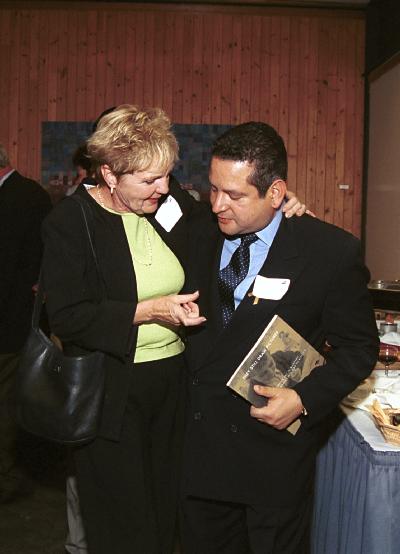October 2, 2003
Spanish, Portuguese Studies looking to grow
A rejuvenated Department of Spanish and Portuguese Studies is aiming to grow by increasing its outreach to the community.
As part of that effort, it played host Sept. 24 to a delegation of consuls from Spain, Mexico and eight other Latin American and Caribbean countries, the delegation’s only stop in Seattle. The events also drew to campus business and political leaders to discuss how the UW can help meet the demand for education in Spanish language and culture in the state.
“We believe the demand for language and culture education is insatiable,” says Tony Geist, the new department chair. “I believe that right now we are not fulfilling our mission for the state and people of Washington. But I realize that, given budgetary restrictions, we will need help from the community if we are to grow.” The department also is working closely with the Jackson School’s Latin American Studies Program, to strengthen offerings beyond language and literature, including areas such as history, political science and economics.
The department currently has 120 majors and is the largest minor in the humanities. But it has just five graduate faculty, down from a high of 10. Lecturers and part time instructors handle a large share of the teaching load. Thirteen sections of first-year Spanish are filled to capacity, and the department has had to turn down many student requests for more sections.
Geist recognizes that if the department is to grow, it must meet community needs. Among the outreach efforts under way is instruction in UW’s Spanish 103 for high school students. Currently, 33 high schools throughout the state use the UW syllabus, which, when mastered by their students, would enable them to move right into second-year Spanish at the UW.
The department is newly home to a Spanish Studies Center, with resources provided by the Spanish ministry of education, which also provides a part time director whose major job is outreach to high schools with Spanish language books, videos and CDs, as well as teaching workshops. “This is a terrific addition to our outreach activities,” Geist says.
Service learning is playing a growing role in the department, with third-year students working in the community — using their language skills with community groups, schools and hospitals. New this year will be a program to encourage adult literacy, in which select students will tutor people wishing to receive the equivalent of a Mexican high school diploma.
The department also will be piloting in Winter Quarter the use of Internet2 in an interactive language-instruction setting involving small high schools that can’t afford their own Spanish instructor. The class will be blended with language students from the UW, who will use a newly installed digital classroom language environment. The goal is to have a daily video-conference Spanish language class.
The department also provides periodic events on campus, such as lectures and concerts. “We need to make those more known to the community,” Geist says.
Geist’s goal is to grow the department back to its previous stature, to again offer a doctoral program, and to create an endowment to sustain the program. “The shortage of funds is a sobering reality. It is clear we cannot meet the public need without new partnerships. And ethically, this is the right thing to do anyway.”

